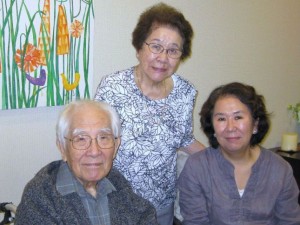Sadao Oba
Sadao Oba, now 90 years-old, served with the Japanese army in Indonesia during the Second World War. In the late 1960s, he was posted by his employer Mitsui to London, where he lived with his family for over 25 years.
I was born in Takagi (then called Totsuka), a farming village in Shizuoka Prefecture in 1922. When I was growing up, Great Britain was one of the major global powers and a provider of templates for our modernisation less than a century earlier. I was interested in its history, technology and culture. Shakespeare was in our curriculum and we were taught to use British, not American, pronunciation in English conversation lessons. I came across English people, a family group, for the first time when I was 15, during a school outing in Hakone. I knew they were English by listening to their pronunciation. However, Japan’s perception of Britain changed in 1930’s, after Japan’s incursion in China. Then Britain, along with other Western powers, began to be seen as colonial interventionists, interfering with Asian countries’ right to self-determination.
Among the Japanese, though, there was no enmity felt towards English or American people on a personal basis generally. When I enrolled at Otaru Higher Commercial School (Now Otaru University of Commerce) in Hokkaido in 1940, there were two English teachers, Mr Duncan, an Englishman and Mr McKinnon, an American. Both were well liked by students, especially Mr McKinnon who was a long-term resident in Japan and who was married to a Japanese woman. However, things changed as Japan moved towards war, and when we came back from summer holidays in September 1941, both Mr Duncan and Mr McKinnon had left, urged to return to their homelands by both their own and Japanese governments. Even so, a more liberal atmosphere prevailed in Hokkaido, maybe due to its status as a relative newcomer to the Japanese nation, and our headmaster, Mr Tomabechi, did not succumb to the prevailing pro-war belligerency. So, all things considered, the rest of my student days were relatively normal, although we were ‘fast tracked’ to graduation to serve in the war effort), until I graduated in September 1942.
I served with the 16th Army in Java, Indonesia. My next encounter with Britain was in October 1945 when a Scottish regiment from SEAC (South East Asia Command) finally reached Bandung to effect our demobilisation. We were a little shocked to see soldiers marching around in what looked like women’s skirts (kilts) but the music they played on bagpipes, such as Auld Lang Syne and The Last Rose of Summer, both of which were also popular tunes in Japan with adapted Japanese lyrics, moved me very much. I volunteered to work as an interpreter in the British officers’ mess, and was repatriated in May 1947.
I made my first trip to Britain in 1954, during a posting to Hamburg with my then employer, Mitsui & Co. Compared with Tokyo or Hamburg, London looked and felt like a major capital city; my first encounter with British culture came at the check-in, when the hotel concierge asked what time I wanted my tea brought to my room the following morning. More trips, as a part of fact finding missions on the emerging EEC, followed during the 1960’s and then I was posted to our London office in 1969. We stayed for more than a quarter of a century, finally returning to Japan in 1995. My younger daughter went through most of her education there, from secondary school to university and is currently working in London.
What did I find in Britain during those 26 years? That it was not quite the place I had imagined for all those years. I shared the somewhat rose-tinted view of Britain that prevailed in Japan but I found that not everyone was the ‘English gentleman’ of our imagination. Compared to a relatively meritocratic post-War Japan, the class system still seemed to be deeply ingrained and higher education a preserve of the privileged elite. But I also admired the importance the country placed on its history and traditions and its work to preserve them through organisations like the National Trust. I also admired the self-sufficiency of the British people. Britain provided me with a good home for those years and I will be eternally grateful for that.

